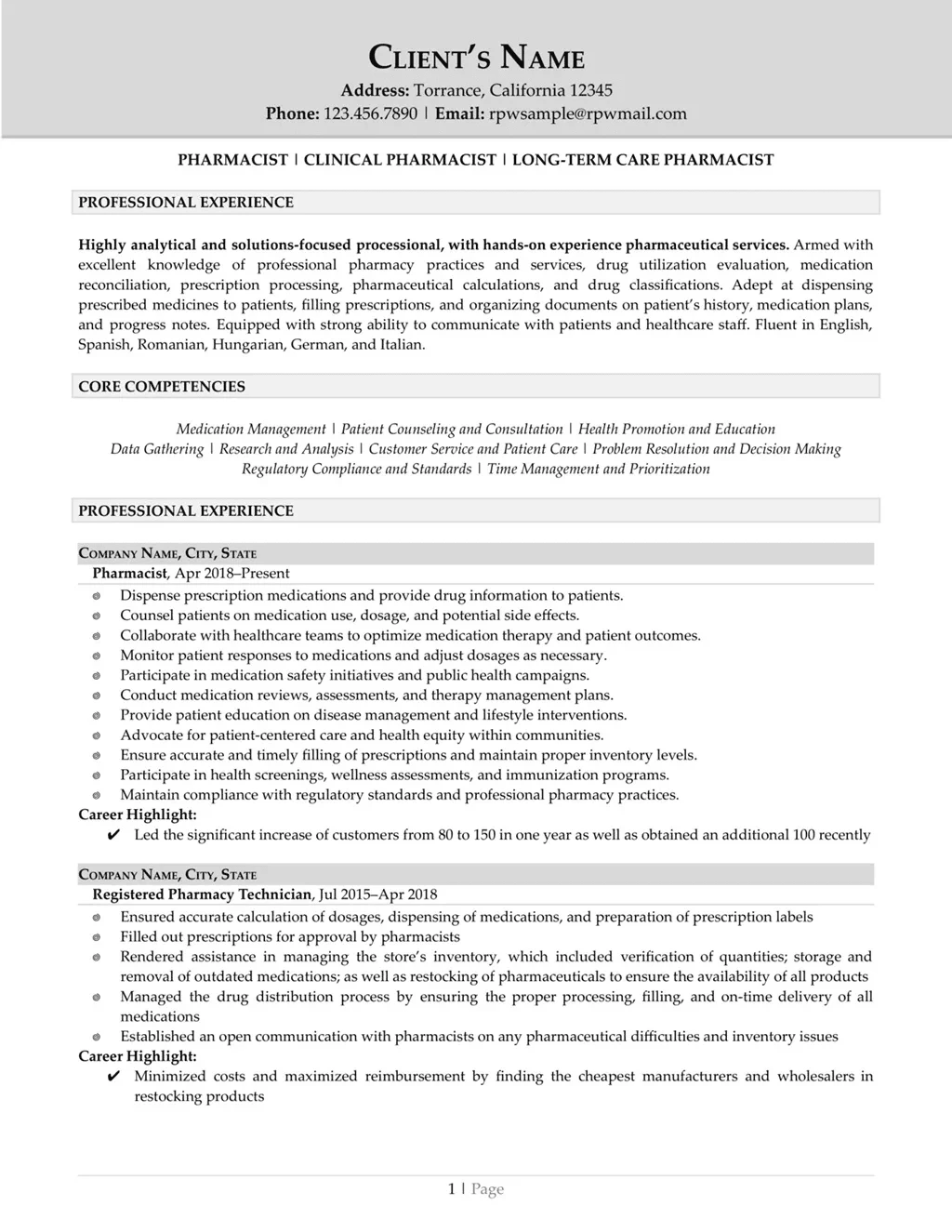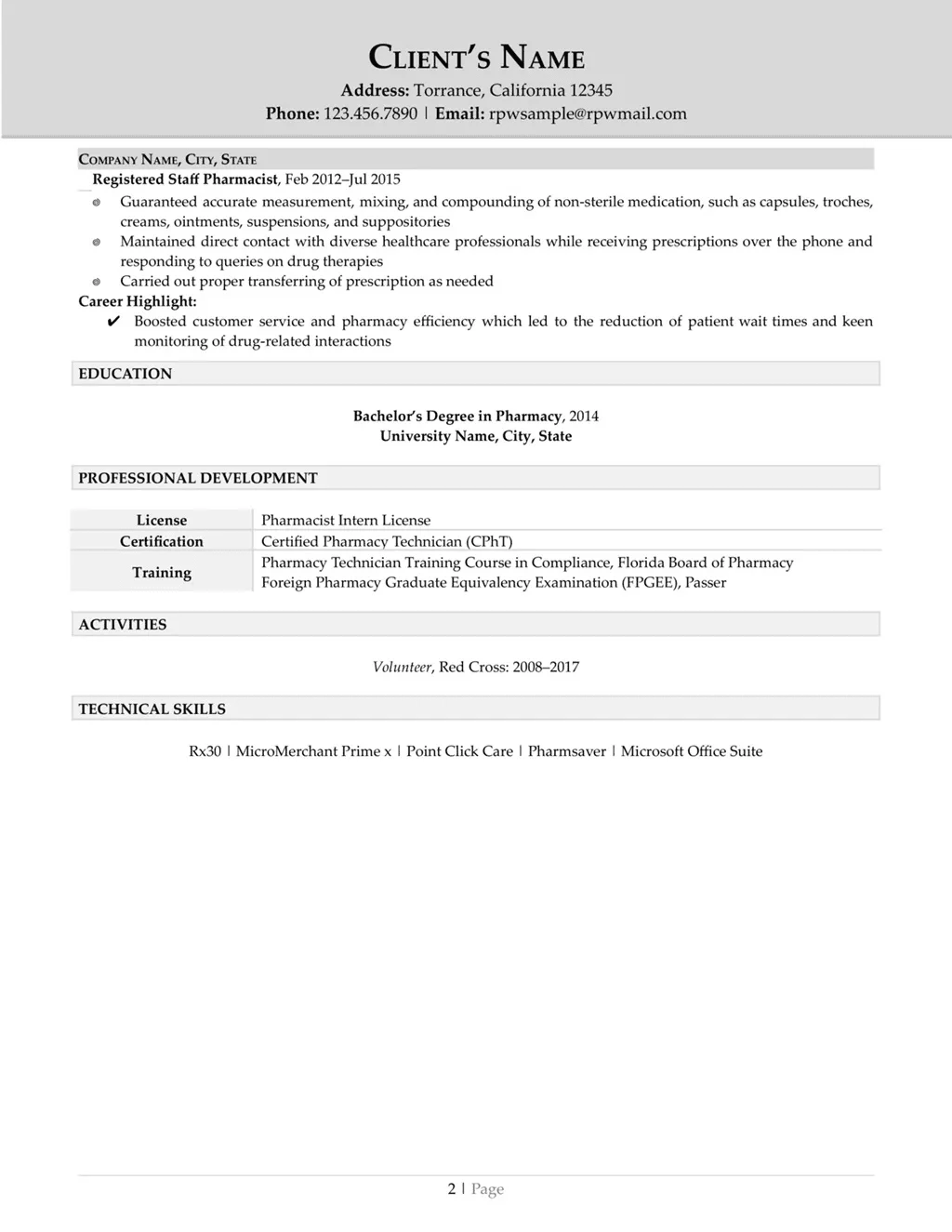A career as a pharmacist offers a unique blend of scientific expertise, patient care, and community involvement. Pharmacists play a critical role in the healthcare system, ensuring patients receive the correct medications and understand their proper use. Whether you’re interested in clinical practice, research, or community health, the path to becoming a pharmacist is both challenging and rewarding.
Given the competitive nature of the pharmacy job market, having an effective resume is crucial. Your resume is often the first impression you make on potential employers, and it needs to highlight your education, skills, and experiences in a way that sets you apart from other candidates.
Don’t worry; with our pharmacist resume example, you’ll be able to have a well-crafted resume. Not just that, in this blog, we’ll provide detailed tips on what to include in your pharmacist resume and how to present your credentials compellingly to land the job you desire.
What is a Pharmacist?
In order to land your target job, you need to know the basics. That being said, let’s first talk about what a pharmacist is. Doing so allows you to write a tool that not only showcases your qualifications but also demonstrates your commitment to patient care and your ability to contribute to a healthcare team.
A pharmacist is a healthcare professional who specializes in the preparation, dispensation, and appropriate use of medications. They play a crucial role in ensuring patients receive the correct prescriptions and understand how to use them safely.
They are often found working in various settings, including community pharmacies, hospitals, clinics, and research facilities. Their expertise in medication therapy management makes them essential in the healthcare system, bridging the gap between patients and the complex world of pharmaceuticals.

What are the Duties of a Pharmacist?
As previously mentioned, pharmacists are integral members of the healthcare team, responsible for a wide range of duties that ensure patients receive safe and treatment.
Here are some of the diverse duties of a pharmacist:
1. Medication Dispensation
One of the primary duties of a pharmacist is to accurately dispense prescribed medications to patients. This involves verifying prescriptions and labelling and preparing medications.
2. Patient Counseling
Pharmacists play a crucial role in educating patients about their medications. They are tasked to explain how and when to take medications; inform patients about potential side effects and interactions with other medications, foods, or alcohol; and give advice on the importance of adhering to prescribed regimens and addressing any concerns about their treatment.
3. Medication Therapy Management (MTM)
MTM is a service aimed at optimizing drug therapy and improving therapeutic outcomes. It comes with a comprehensive medication review, developing treatment plans, and monitoring the patient’s progress.
4. Health and Wellness Promotion
Pharmacists contribute to public health by promoting wellness and preventive care. They administer vaccinations, conduct health screenings, and offer guidance on diet, exercise, smoking cessation, and other lifestyle changes to improve health outcomes.
5. Prescription Review and Verification
To ensure patient safety, pharmacists meticulously review prescriptions by checking for accuracy of the prescribed drug, dosage, and administration route; assessing for interactions with other medications the patient is taking; and performing allergy checks.
How Do You Become a Pharmacist?
Becoming a pharmacist involves a series of educational and professional steps that equip you with the knowledge and skills necessary to excel in this vital healthcare role. Here’s an overview on how to pursue a career in pharmacy:
1. Complete pre-pharmacy requirements
2. Earn a bachelor’s degree
3. Complete a Pharm.D. program
4. Obtain licensure
5. Gain practical experience
6. Consider specialization or residency
7. Continue professional development

What to Include in Your Pharmacist Resume
A well-crafted pharmacist resume is essential to standing out in a competitive job market. Thus, it needs to have what it takes to pass the applicant tracking system (ATS) and, of course, the hands of the hiring managers. Here are key elements to include.
Contact Information
Write your full name, complete mailing address, contact number, and email address. If you have a LinkedIn profile, include its link. Additionally, add your certifications beside your name; doing so attracts recruiters’ interest.
Ensure your contact information is complete and professional:
- Full Name: Use the name you professionally go by.
- Phone Number: Provide a reliable number where you can be easily reached.
- Email Address: Use a professional email address.
- LinkedIn Profile: Include a link to your LinkedIn profile, ensuring it is up-to-date and reflects your professional background.
Specific Target Job
Some refer to this section as a career tag. Clearly state your target job here to inform hiring managers of the position you’re applying for. This helps ensure your application doesn’t get confused with resumes intended for other positions.
Professional Summary
Craft a concise professional summary that highlights your experience, skills, and career goals:
- Experience: Summarize your years of experience in pharmacy and the types of settings you’ve worked in (e.g., community pharmacy, hospital).
- Skills: Highlight key competencies such as medication therapy management, patient counseling, and regulatory compliance.
- Career Goals: State your professional objectives and what you aim to achieve in your next role.
Education
Include your education details in your pharmacist resume. List your complete degree and course title, school name and location, and your inclusive dates. Providing this information can boost your chances of receiving an interview invite.
Licensure and Certifications
Detail your pharmacy licensure and any other relevant certifications:
- Pharmacy License: Include the state(s) where you are licensed to practice, license numbers, and expiration dates.
- Additional Certifications: List certifications such as immunization certification, medication therapy management (MTM), or any board certifications (e.g., BCPS, BCACP).
Professional Experience
Provide a comprehensive overview of your work history, focusing on relevant roles. Don’t forget to highlight key responsibilities and notable achievements. Use bullet points to detail your duties and quantify your accomplishments where possible (e.g., “Managed a pharmacy team of 10, improving medication dispensing accuracy by 20%”).
Skills
Outline the key skills that make you an effective pharmacist:
- Clinical Skills: Medication therapy management, patient counseling, drug utilization review.
- Technical Skills: Proficiency with pharmacy software, compounding, and dispensing medications.
- Regulatory Knowledge: Understanding of pharmacy laws and regulations, DEA regulations, and compliance with healthcare standards.
Professional Affiliations
Mention any memberships in professional organizations to demonstrate your engagement with the pharmacy community:
- American Pharmacists Association (APhA)
- American Society of Health-System Pharmacists (ASHP)
- State Pharmacy Associations
- Other Relevant Organizations
Continuing Education
Include any relevant courses or training that demonstrate your commitment to staying current in the field:
- Continuing Education Courses: List recent courses, workshops, or seminars attended.
- Advanced Training: Mention any advanced training or certification programs you have completed.
- Professional Development: Highlight participation in conferences, webinars, or other professional development activities.
Expert Tip:
A well-structured resume not only highlights your strengths but also helps you stand out in a competitive job market, increasing your chances of securing your desired position.
How to Write Your Pharmacist Resume
Now that you have the list of information to include in your job search document, let’s put it into practice. Here are some tips to consider when writing your pharmacist resume:
1. Go for a Simple, Yet Engaging Design
A pharmacist resume with a straightforward yet appealing design exudes professionalism. Avoid overly fancy fonts and excessive design elements, as they can hinder readability.
2. Select the Right Resume Format
Choose a resume format that highlights your qualifications, skills, and experience. If you have several years of experience in pharmacy, the chronological resume format is typically the most suitable choice.
3. Emphasize Your Skills
Ensure that you highlight your key skills in the skills section of your resume, as they will be highly valued by prospective employers.
4. Incorporate Relevant Keywords
Utilizing resume keywords is essential for navigating through ATS and catching the attention of hiring managers. Be sure to include relevant keywords throughout your pharmacist resume.
5. Provide Concrete Data and Examples
While listing your skills and achievements is important, quantifying them adds depth to your resume. Add specific examples and use numerical data whenever possible to demonstrate your qualifications .
6. Proofread Thoroughly
Before submitting your resume, meticulously review all details to ensure accuracy. Repeatedly read through your resume to catch any grammar errors, misspellings, or improper punctuation usage.
Pharmacist Resume Example
To paint a clear picture, our expert team curated a pharmacist resume example. Take note of how writers outline qualifications.


Download a copy of the pharmacist resume example above
Elevate Your Pharmacist Resume with Resume Professional Writers’ Expert Help
Crafting a standout pharmacist resume is crucial in today’s competitive job market. To ensure your resume highlights your qualifications and experience, consider seeking assistance from resume writing experts.
Guess what? You don’t need to look elsewhere. We’ve got the right team for you! Our professional writers are not just experts in resume writing, but are also adept at the ins and outs of the pharmaceutical industry. With their expertise in both the field and in tailoring resumes for the pharmacy profession, we can help you present yourself in the best possible light to potential employers.
So, don’t let your resume hold you back from securing your dream job as a pharmacist. Invest in our professional resume writing services today and take the next step toward advancing your pharmacy career.





